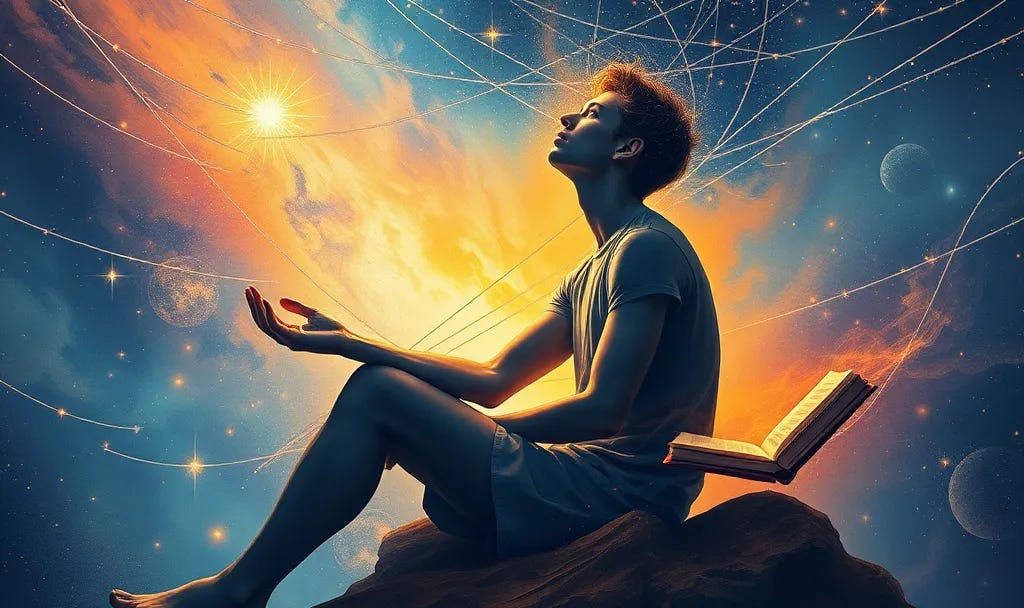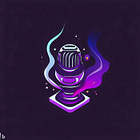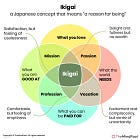How Much Time Do You Spend Creating?
Why the mundane moments of life are your greatest opportunity for divine expression
The other day, I wrote about how often we think. To be more specific, I was talking about how often we think critically.
How often do we examine our thoughts? How often do we sharpen the thoughts that come into our minds? If you haven’t read that piece, I encourage you to check it out because what I’m about to share builds directly on that foundation.
As soon as I posted that article on thinking, I started reflecting on another question: How often do we create?
These insights come from the book The Thinker’s Way, and one of the biggest lessons I’ve learned from it is this:
“We have this idea that creation is just for specific individuals. It’s just for artists. It’s just for musicians. It’s just for leaders. They’re the only ones who create.”
But the argument is no—creation is a part of every day of life, and we all can do it.
So in this piece, we’re going to explore three things:
What is creation?
Why don’t we create?
And how do we get back to creating?
Without further ado, let’s dive right in.
Part One: What Is Creation?
You can get all kinds of technical about what creation is. But ultimately, for our conversation here, the art of creation is this:
“Adding your unique spark to things.”
You may not need to reinvent the wheel, but you are using the wheel in a different way. This perspective of looking at the wheel differently has led to other inventions in our reality.
The wheel became the gear. The gear became the pulley system. The pulley system became the conveyor belt. Someone looked at a spinning wheel and created the pottery wheel. Another person saw rotation and invented the waterwheel to mill grain.
You didn’t reinvent the wheel—you just found other uses for it.
This is the art of creating: interacting with everyday life through your divine spark.
As we can see, there are different levels on the spectrum of creation:
You can have your morning routine in a specific way that you’ve created. You’ve created how you work about your day. That’s on the individual impact level of personal creation.
Then you have another level—creating masterpieces of art, films, proposals, systems—creations that impact many, maybe even millions.
But the key here is that creating is a function of life.
It’s an essential aspect of life because, at the end of the day, we should be creating something, we should be putting our soul’s essence into physicality on this manifest reality here on earth.
“We should be putting our soul’s essence into physicality on this manifest reality.”
This is creating as God the Father has. This is why creation is a vital aspect of life.
But we don’t create. And that brings us to part two.
Part Two: Why We Don’t Create
In our modern world, we don’t create for one reason: aside from not knowing how to, we have traded convenience for creation.
As a millennial, I remember the days before smartphones. I could memorize so many different phone numbers, and I had to be creative about how to build this repository of numbers in my head.
And listen, even before GPS, there were maps. You had to read a map. Mapquest anyone? You had to know where you were going, and you could choose different routes to reach your destination. Today, we have GPS for that.
These are quick examples of how convenience has diminished some aspects of creation in our lives. You don’t create a letter anymore—you just text somebody.
And so we have to understand this evolution in human history.
Technology is an aspect of human history. From an esoteric perspective, Rudolf Steiner talked about technology and the Ahrimanic energy.
I’ve talked about this in my podcast The Beauty of Good and Evil, and in my work on The Foundations of Reality. Technology, like fire, can be extremely beneficial, but it can also destroy. I’m using technology right now to spread this message that’s impacting your life, but it could also be used to waste time on social media.
The Ahrimanic energy—if you’re not familiar with it, check out my manifesto and my other work on the foundations of reality—is an energy that is very logic-driven.
In a society where Ahrimanic energy has run rampant, we’ve lost much of the passions of life, the stimulations of it. This can be seen as the “Prometheus fire” that’s needed to restore the human essence.
As Rudolf Steiner said, technology will corrupt us if we’re not careful. We need to be mindful as this merger with technology happens, because this is a transhumanistic event that we seem to be heading towards.
Now we have AI. With AI, we won’t even be able to create our own thoughts—as I talked about in my piece yesterday on thinking. We’ll just let the AI do the thinking for us.
Part Three: How to Get Back to Creating
Fortunately, the solution is extremely simple.
Just start creating.
And to start creating, you first have to be aware. You have to be aware of who you are and what exactly you want to create. What in your life would you like to be different?
How do you do that? It starts with awareness. If you’ve read my book, I layout the formula: awareness, then intention.
How can you put your flavor into anything that you do in your life? How do you drive to work differently? Do you want to follow the GPS, or do you want to find something else? How do you cook this food? You know the recipe, but what if you add something that brings your soul—who you really are—into things?
And if you want to find out who you are, what your purpose is, check out my guide, Three Steps to Find Your Purpose.
Whatever it is, you want to start being aware of it. It pulls your essence into this. And you start to think about it.
And again, if you haven’t read my article before, thinking is when you walk with God. The art of creating starts with thinking. Thinking has also been called the language of the soul.
This is how we pull everything together. When we start to think, then we start to create. The next thing you know, you see where this goes.
Conclusion
Creation is what we’re supposed to be doing. It keeps us alive. It’s vital. It’s our soul empowering our body.
But somehow along the way—we can’t say we forgot it. We’ve been distracted from it. We’ve given our birthright away. We’ve been deceived into giving our birthright away.
But by being aware, by being intentional, we can bring creativity into our life every single day. We can start thinking about things, being mindful of our thoughts, and creating from those thoughts.
Because ultimately, what we’re here to do is create a life worth living—which is the motto of Unorthodoxy.
Takeaways
Creation is not elite - It’s not reserved for artists and leaders. Creation is the act of adding your unique spark to everyday life, from your morning routine to how you navigate your commute.
The wheel metaphor - You don’t need to invent something from nothing. The wheel became the gear, the pulley, the pottery wheel. Creation is seeing what exists and finding new uses through your unique perspective.
The convenience trap - We’ve traded creation for convenience. GPS replaced map reading. Texting replaced letter writing. AI threatens to replace thinking itself.
The creation formula - Awareness → Intention → Action. You must first know who you are, then deliberately choose to infuse your essence into your daily actions.
Thinking precedes creating - As established in the previous article, thinking is walking with God. Creation is the natural extension—it’s the soul’s language made manifest on this physical plane.
Your birthright has been stolen - Not forgotten, but deliberately removed through distraction and deception. Reclaiming it requires conscious, daily practice.
Next Steps
Start small tomorrow morning - Choose one mundane task (making coffee, driving to work, responding to an email) and ask: “How can I add my unique spark to this?” Don’t overthink it. Just do it differently than you did yesterday.
Track your creation time - Just as we measured thinking time in the last article, now measure creation time. For every 10 minutes of consumption (scrolling, watching, passive intake), aim for 30 minutes of creation (writing, building, cooking, problem-solving with your own mind).
Examine your convenience dependencies - Make a list: Where have you outsourced your creativity to technology? Pick one to reclaim this week. Memorize a phone number. Navigate without GPS once. Write a handwritten letter.
Join the conversation - Share in the comments: What’s one area of your life where you’ve stopped creating? What’s one small act of creation you’re committing to this week?
As always, thank you for the time and attention. Have a great and wonderful day.
—Ashe,
Franklin O’Kanu
If you enjoyed this work and gained value from it, support more work like this by becoming a paid subscriber for $5/month
Related Reading
If you found value in this exploration of creation, these articles will deepen your understanding:
The Unorthodoxy Mantra - Your daily spiritual practice includes activating your roots—your creative and survival energy. This mantra is how you prime yourself each morning to live as a creator, not a consumer.
How Much Time Do You Spend Thinking? - Creation begins with thinking. This companion piece explores how industrialization systematically eliminated critical thinking from our lives, and why thinking is an act of communicating with the divine.
The Foundations of Reality - To understand why technology disconnects us from creation, you need to understand the Five Principles: Source, Ahrimanic, Luciferian, Christos, and Druj. This deep dive into Zoroastrianism reveals the spiritual operating system behind reality itself.
Your Body Is a Temple—Here’s How to Actually Use It - Your roots (creative and survival energy) are under constant attack. This piece explores how to reclaim your temple and use it to interact with manifest reality.
Three Behaviors You Lost Due to Industrialization - Thinking was one. Creating was another. This article maps the systematic removal of essential human capacities and how to restore them.
The Aether Is What It’s All About - When you create, you’re tapping into the ether—the field where thoughts and energies reside. This exploration reveals the higher frequencies beyond Wi-Fi and cellular bands.
If you’re already aware but want to take a step toward becoming the best human you can be, you can check out my guide.
11 Insights for Being The Best Human This 50-page guide is the clearest map I’ve created for navigating the madness of modern life. It blends ancient wisdom, spiritual clarity, and grounded daily ritual — helping you remember who you are and why you’re here.
If the world feels off, this guide will confirm why — and help you take back control.
Support Unorthodoxy!
If this article opened your eyes, there’s more behind the paywall. Exclusive, in-depth pieces that go deeper, challenge more, and reveal the truths they don’t want us to see.
🔑 Become a paid member and gain access to premium and archived articles, exclusive podcasts, and thought-provoking chats you won’t find anywhere else.
📖 Prefer a comprehensive take? My book, An Unorthodox Truth, is a fact-based journey through 200 years of deception—a must-read for those seeking clarity in a manipulated world.
☕ Feeling generous? Leave a simple tip to support this work—every bit helps me continue creating meaningful content.









I agree, Franklin. We were created to create. The gift of free will is the foundation as we can literally do anything we choose do to. Make whatever we want. Go wherever we want. And we can do these things with whatever flare we want. We can choose to be happy or mad. We can choose to dance while we are cooking. The ability to create literally adds flavor and pizzazz to our world and the options are limitless what we can create. Taking this further… we can SAY whatever we want. And those words affect our world on profound and unseen ways. Emoto’s water experiments proved this in a way we can see. What we say creates designs in the ether that causes ripples lasting much longer than it takes to say the word. We choose our words and can affect our world in ways we can’t see- good and bad. Plants, animals, children… even our own mind hear our words and these words literally shape our reality. We are more powerful than we realize.
Very excellent article and reminder Franklin, deeply appreciated. Always beautifully written 🥰🙏🌹